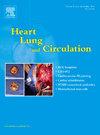Implementation Barriers to Evidence-Based Cardiovascular-Kidney-Metabolic Syndrome Management
IF 2.2
4区 医学
Q2 CARDIAC & CARDIOVASCULAR SYSTEMS
引用次数: 0
Abstract
Cardiovascular-kidney-metabolic (CKM) syndrome is a newly defined health syndrome, encompassing the overlapping pathophysiology and risk factors of cardiovascular and kidney disease, obesity, and type 2 diabetes. It is the leading cause of morbidity and mortality worldwide, with an annual health cost of approximately AUD $24 billion in Australia alone. A disproportionate burden is observed among those with adverse social determinants of health. Despite compelling evidence demonstrating improved metabolic risk factors and reduced risk of kidney failure and cardiovascular events, uptake of traditional and novel cardio-kidney metabolic therapies, including sodium-glucose cotransporter 2 inhibitors, glucagon-like peptide-1 receptor agonists, and non-steroidal mineralocorticoid receptor antagonists, remains low. This delay underscores many challenges to optimal CKM syndrome care, including system barriers such as public health policy, siloed health care, and inequitable access to pharmacotherapies; provider barriers, including lack of awareness and clinical inertia; and patient barriers such as social determinants of health. A global shift in the approach to healthcare that focuses on multidimensional, multidisciplinary care and provision of pharmacotherapies in patient groups most at risk is required to change the trajectory of this public health emergency.
循证心血管-肾脏代谢综合征管理的实施障碍。
心血管肾代谢综合征(CKM)是一种新定义的健康综合征,包括心血管和肾脏疾病、肥胖和2型糖尿病重叠的病理生理和危险因素。它是全世界发病率和死亡率的主要原因,仅在澳大利亚,每年的医疗费用就约为240亿澳元。在具有不利健康社会决定因素的人群中,观察到不成比例的负担。尽管有令人信服的证据表明代谢危险因素得到改善,肾衰竭和心血管事件的风险降低,但传统和新型心肾代谢疗法(包括钠-葡萄糖共转运蛋白2抑制剂、胰高血糖素样肽-1受体激动剂和非甾体矿皮质激素受体拮抗剂)的接受率仍然很低。这种延迟强调了优化CKM综合征护理的许多挑战,包括公共卫生政策、孤立的卫生保健和药物治疗的不公平获取等系统障碍;提供者障碍,包括缺乏认识和临床惰性;患者障碍,如健康的社会决定因素。要改变这一突发公共卫生事件的发展轨迹,就需要在全球范围内改变卫生保健方法,将重点放在多维、多学科护理和向风险最大的患者群体提供药物治疗上。
本文章由计算机程序翻译,如有差异,请以英文原文为准。
求助全文
约1分钟内获得全文
求助全文
来源期刊

Heart, Lung and Circulation
CARDIAC & CARDIOVASCULAR SYSTEMS-
CiteScore
4.50
自引率
3.80%
发文量
912
审稿时长
11.9 weeks
期刊介绍:
Heart, Lung and Circulation publishes articles integrating clinical and research activities in the fields of basic cardiovascular science, clinical cardiology and cardiac surgery, with a focus on emerging issues in cardiovascular disease. The journal promotes multidisciplinary dialogue between cardiologists, cardiothoracic surgeons, cardio-pulmonary physicians and cardiovascular scientists.
 求助内容:
求助内容: 应助结果提醒方式:
应助结果提醒方式:


